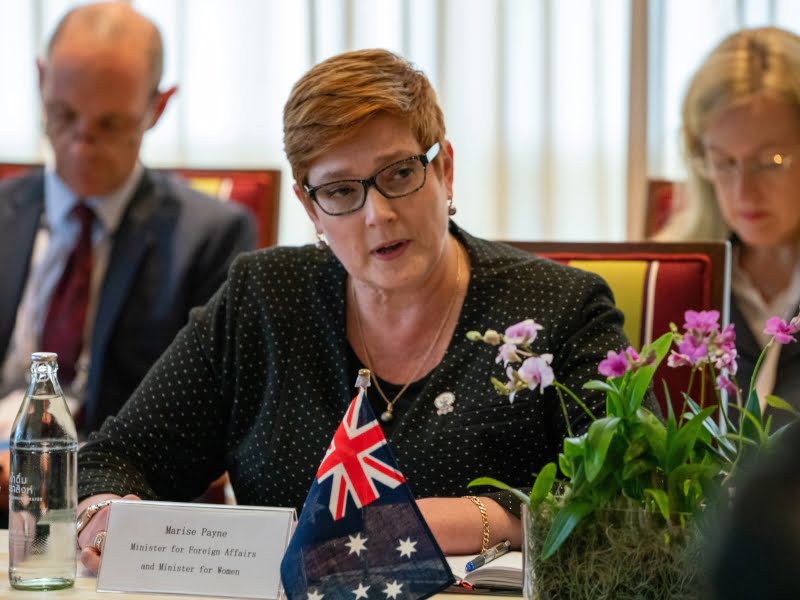Australia has pledged $37.5 million to its regional neighbours to sure up their cyber defences and will seek to establish a new global agreement on responsible cyber behaviour, as part of a new international engagement strategy launched Wednesday by the government.
Labor has criticised the plan for being months behind schedule, failing to support local institutions, and lacking “real action”.
Developed by DFAT last year but only launched on Wednesday due to Foreign Affairs Minister Marise Payne’s “scheduling” issues, the International Cyber and Critical Technology Engagement Strategy outlines Australia’s plans to use cyber and critical technology in a “more dynamic and contested regional environment”.

The original 2017 cyber engagement strategy has been expanded to include “critical technologies”, defined as technologies that have the capacity to significantly enhance or threaten national interests. They include things like AI, 5G IoT, quantum computing and synthetic biology as well as cyber security, according to the strategy.
“Countries and companies at the cutting edge of innovation in these critical technologies often promote values that are at odds with our own,” Minister Payne writes in the new document’s forward.
The three pillars of the strategy are values, security, and prosperity. Australia will pursue, support, and oppose efforts to undermine them, according to the plan.
The strategy will be used to guide Australia’s international engagement “across cyber and critical technology issues” in the hopes of leveraging technological innovation while avoiding the risks it creates.
As part of the strategy, the government announced a package of measures to support regional neighbours to build and maintain their own cyber resilience.
Australia will co-sponsor a proposal to establish a new United Nations Program of Action for Responsible State Behaviour in Cyberspace. All UN members already agree the Charter of the UN in its entirety is applicable in cyberspace, but the Australian government will push for a new dedicated cyber behaviour program.
Australia’s flagship Cyber Cooperation Program, established in 2016 to support the cyber resilience of countries in Southeast Asia and Pacific, has also been rebranded Cyber and Critical Tech Cooperation Program and will receive an “additional $20.5 million” in funding.
But the program will drop pacific nations, which will now receive cyber support separately, including $17 million announced Wednesday to strengthen their capabilities and resilience.
The government said it will also support partnerships between Australian and Indian universities through an Australia-India Cyber and Critical Technology Partnership program.
“The Strategy’s aims, to strengthen national security, protect our democracy and sovereignty, promote economic growth, and pursue international peace and stability, are founded in Australia’s national interests,” Foreign Affairs Minister Marise Payne said in a statement.
The Opposition have questioned the plan, however, saying it fails to support Australian institutions or show “real leadership”.
A joint statement from Shadow Minister for Foreign Affairs Penny Wong and Shadow Assistant Minister for Cybersecurity Tim Watts said, “Many of Australia’s most significant social and economic opportunities, as well as geostrategic and security challenges, are currently unfolding through the prism of cyber and critical technologies.
“Yet Australian industries and institutions have been left to go it alone. The strategy does not propose any new actions by the Morrison Government to tackle the billion-dollar wave of ransomware attacks Australian business are facing from international cybercrime groups.”
Mr Watts last month told Parliament a lack of leadership on cybersecurity from the Morrison Government, including declining to attribute or seriously address major attacks publicly was putting Australians at risk.
Labor has also released its own ransomware discussion paper which includes calls for diplomatic cooperation on practical measures to address global cybercrime. The party also wants democratic institutions considered critical infrastructure.
In the joint statement, Mr Watts and Ms Wong said the government’s latest engagement strategy represented more risky rhetoric and lacked practical measures.
“In her speech launching the strategy, the Foreign Minister referenced cyber-attacks on the Australian Parliament and political parties, declaring that ‘attacks on democracy cannot go unchallenged’.
“But the Morrison Government has never taken any action to challenge those responsible for the 2019 cyber-attacks on the Australian Parliament, nor has it publicly attributed responsibility — despite all its tough talk.”
Do you know more? Contact James Riley via Email.

